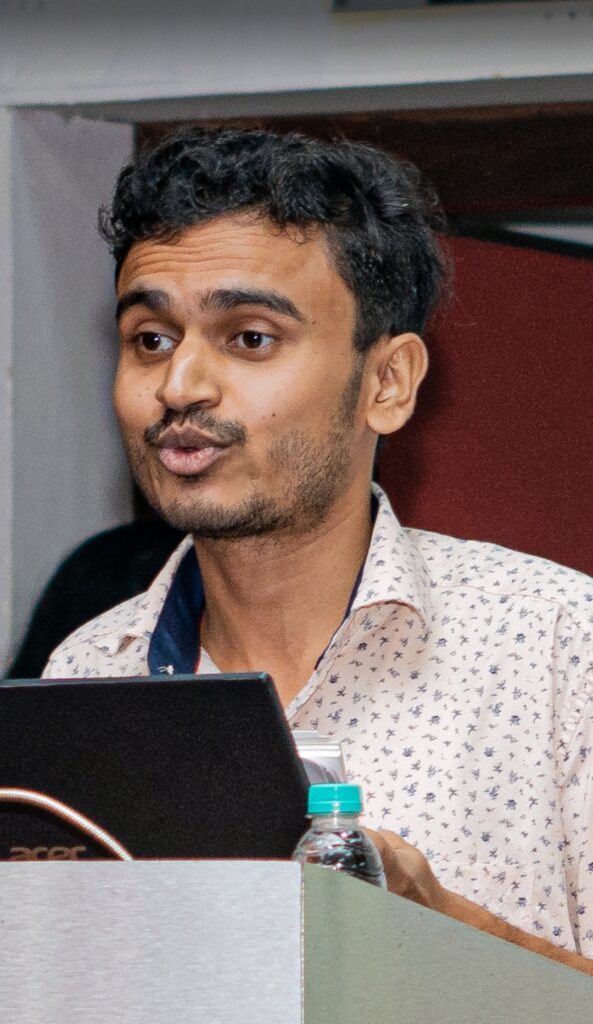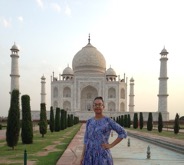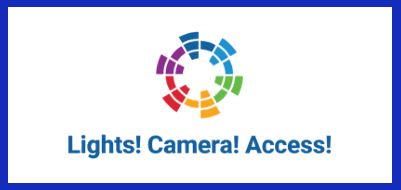Date:
Editor: Taylor Hamilton

[Image Description: A brown-skinned Indian man (Puneet Singh) stands at a podium, dressed in a button-down shirt, while speaking to the crowd]
Hello, Puneet! Welcome to the Lights! Camera! Access! (LCA) Newsletter and Marketing Team interview. Who is Puneet Singh Singhal and how did your journey begin in the disability community?
I was born in a slum in Delhi, India. My father was an alcoholic and abused my mother and me. Later, my mother faced serious mental health issues and chronic illness. These circumstances led me to become the sole financial support and caregiver for my mother. While taking on this role, I struggled with multiple non-apparent disabilities, such as dyslexia, dyspraxia, and stammering.
Later, I founded ‘ssstart’, an organization that works toward normalizing speech & communication disabilities. Currently, I offer workshops and trainings through the Global Network of Young Persons with Disabilities, fight for accessibility in digital spaces with Accessible Connect, and strive to empower young people with disabilities as Chief Discoverability Officer for Billion Strong.
Can you share about your career, education, or advocacy involvement?
I graduated with a Bachelor of Arts in English literature in 2017 and then earned a Master of Arts in International Relations.
Professionally, I began my career as a Lead Project Manager at the Caring Hands Foundation before working as a Changemaker at KidsRights Changemaker. In 2021 I used my lived experience with non-apparent disabilities to find ‘ssstart’, an organization that normalizes speech disabilities. I am also the Chief Discoverability Officer and Global Lead for the disability empowerment organization Billion Strong and a Community Lead at the Global Network for Young People with Disabilities.
What are your hopes, goals, and expectations for yourself?
My main hope is to build a solid and engaged community of young people with disabilities. I aim to empower them to lead dignified lives through community building, skills development, and increased access to resources. I also strive to encourage advocacy for policies that improve the lives of those within the disability community. I am passionate about working towards a more inclusive society where young people with disabilities are seen as valuable, contributing members.
What was your entrance strategy to DEI after a career in banking?
I transitioned from a career in banking to Diversity, Equity, and Inclusion (DEI) because I wanted to share my lived experience and contribute to global disability inclusion. I utilized my background in banking to understand organizational structures and financial strategies. These are crucial for implementing effective DEI programs in large corporations and communities. I am committed to deepening my understanding of DEI and the complex dynamics of inclusion by attending workshops, seminars, and conferences.
I began sharing my journey through public speaking, advocacy, and writing. I also built connections with DEI professionals who shared my passion for change. This strategic approach allowed me to blend my professional skills with my mission to fight for disability inclusion.
Can you discuss your achievements, where they’ve been showcased, and how others can leverage their talents in any industry?
I began receiving awards in 2022 when I was honored as a Listee by D-30 Disability Impact.
In 2023 alone, I received the Commonwealth Innovation Award for sustainable development, the Genius within CIC Rising Star Award for making a considerable impact on the disability community in a short period, and the Disability Unite Got Talent Award. I also spoke at the Accessible & Inclusive Design Conference and published an article in Design for All Magazine.
More recently, in 2024, out of nearly 700 applicants, I was selected as a semi-finalist for the Young Global Changers Recoupling Award, given by Global Solutions Initiative. I was also featured in Forbes for my DEI activism. In addition, I was honored as a Purple Ambassador for Speech and Language Disabilities for India’s first-of-its-kind inclusive festival that celebrates persons with disabilities.
What challenges have you faced in your career field because of your disabilities?
As an individual with dyslexia, dyspraxia, and stammering, navigating my career has been challenging. Reading and organizational tasks take longer, making it difficult to meet typical productivity expectations. Stammering adds another layer of difficulty, especially in meetings and presentations where clear communication is crucial. I’ve often felt misunderstood and overlooked for opportunities because my speech is not fluid. Through these experiences, I have learned the importance of patience and advocated for workplace understanding and accommodation.
How has belonging to the working class influenced your disability activism?
Being a member of the working class while navigating disability has profoundly shaped my activism. Financial constraints add a significant burden, complicating access to necessary accommodations that could alleviate daily challenges. The costs associated with adaptive technologies and specialized healthcare are prohibitively high. They are frequently not covered by basic insurance and sometimes insurance is unavailable. This economic barrier intensifies the systemic inequalities I face, making professional advancement and personal development more strenuous. My experiences have fueled fierce advocacy for economic and accessibility reforms, pushing for systems that truly support those at the intersection of disability and economic disadvantage.
What Indian policies have hindered disability progress?
Inadequate implementation of policies in India has led to a lack of respect for disability rights, limited accessibility to infrastructure, and educational barriers. The Rights of Persons with Disabilities Act promises equal rights and opportunities but often falls short in practice. Insufficient enforcement and lack of awareness among authorities result in inconsistently upheld policies. Policies aimed at making public spaces accessible are also not consistently applied. Many buildings, transport systems, and public areas lack the necessary accommodations, isolating individuals with disabilities. Finally, although inclusive education policies exist, the integration of students with disabilities into mainstream schools is minimal. Schools often lack the resources, trained staff, and infrastructure to support diverse learning needs.
Is there anything you would like to share with us about your experiences with ableism? What practices have you implemented while navigating through an ableist culture?
Navigating through an ableist culture, I regularly educate my peers and superiors about disabilities, emphasizing the capabilities and potential of all individuals and building allies along the way.
I speak up about my needs and the adjustments required to perform optimally. This step involves requesting specific accommodations and explaining their importance.
In the public sphere, I participate in forums and discussions to advocate for more robust anti-discrimination policies and better implementation of existing laws. To sustain my resilience through this work, I practice self-care and prioritize connecting with a supportive community that reinforces my values.
Is there anyone you consider your mentor and what makes them important in your life?
In my journey to overcome challenges and develop essential skills and knowledge, Debra Ruh, CEO of Ruh Global and Chair of Billion Strong, has been an instrumental figure. Her role transcends that of a typical boss; she is a constant support, mentor, and cheerleader in the truest sense.
Debra’s approach to mentorship and leadership stands out in several ways. First, her confidence in my abilities is crucial. She has consistently shown trust in my skills and judgment, which has boosted my self-confidence and encouraged me to take on challenges I might otherwise have hesitated to face. This kind of support, stemming from genuine belief in someone’s potential, is rare and immensely empowering.
Moreover, Debra’s leadership style involves giving space and autonomy. She has never micromanaged. She understands that true growth comes from allowing individuals to navigate their paths, make decisions, and learn from their experiences. This approach has not only helped me hone my decision-making skills. It has also fostered a sense of responsibility and ownership for my work.
To ensure rights for everyone globally, what advice can you offer about preserving rights (disability accessibility, employment, etc.)?
First, increase awareness about disabilities through education and media campaigns. Educating the public can foster understanding and support for inclusive policies. Similarly, advocate for strong, clear laws that enforce disability rights and accessibility standards. Laws need to be comprehensive and include penalties for non-compliance. These policies involve conducting regular audits of public spaces and companies to ensure compliance with accessibility laws.
In addition, they encourage organizations to employ people with disabilities and provide necessary accommodations without bias. Make sure people with disabilities have access to quality education that leads to quality employment opportunities. This includes ensuring educational institutions are accessible.
Finally, be certain, at all levels of decision-making, that all aspects of these processes involve people with disabilities. This inclusion ensures that the measures taken are practical and beneficial.
What changed your mindset from shame about your disability to pride?
As I shared my journey on social media, meeting amazing friends from the global disability community helped me be vulnerable and authentic.
What policies make you hopeful about DEI progress in India?
First, the Rights of Persons with Disabilities Act empowers people with disabilities. It covers a range of rights and entitlements, including accessibility, education, employment, and social security. These are crucial for full participation in society. Second, the Accessible India Campaign aims to enhance mobility for people with disabilities by improving physical environments and transportation systems.
To aid individuals with disabilities professionally, the National Action Plan for Skill Development provides vocational training and employment opportunities for people with disabilities. This policy aims to integrate people with disabilities into the mainstream workforce and make workplaces more inclusive. Similarly, to ensure persons with disabilities have the knowledge to succeed in the workforce, efforts to integrate students with disabilities into regular schools are expanding. Policies are emerging to make educational materials and environments accessible to all. Finally, the government’s push towards digital accessibility promotes inclusivity in the information age.
If you were to advise people about finding their authentic selves within the disability community, or wondering how to become an ally, what would you say to them?
Finding your authentic self within the disability community or becoming an ally involves introspection, education, and active participation. At the beginning of your journey, it is crucial to educate yourself. Learn about different disabilities, the challenges faced by those with them, and the history and achievements of the disability rights movement. Listen to the experiences of individuals in the disability community. Reflect on how these experiences resonate with or differ from your own and consider what you can learn from them.
Once you have knowledge of and empathy for the disability community, it is essential to engage respectfully. Participate in community events and discussions. Furthermore, use your position to advocate for accessibility and inclusion. Whether in your workplace, school, or local government, advocate for policies that support the rights of people with disabilities.
Finally, be consistent. Support isn’t a one-time act. Consistency in your advocacy and allyship demonstrates commitment to the community.
Where can we follow you online (social media and websites)?
LinkedIn- https://www.linkedin.com/in/puneet-singhal/
Twitter/X- https://twitter.com/puneetsinghal22
Website- www.ssstart.org

About the Author: Taylor Hamilton is a contributing Intern Writer – with Lights! Camera! Access! (LCA) Newsletter/Marketing Team. Taylor is a veteran journalist who’s passionate and driven about disability global issues. Taylor is a language nerd who stays up too late watching true crime.
[Image Description: An African American woman (Taylor Hamilton) dressed in a multicolor dress, and eyeglasses. One hand is propped on her hip and the other hangs downward to Taylor’s side. Taylor stands in front of the Taj Mahal in India during a sunset.]
